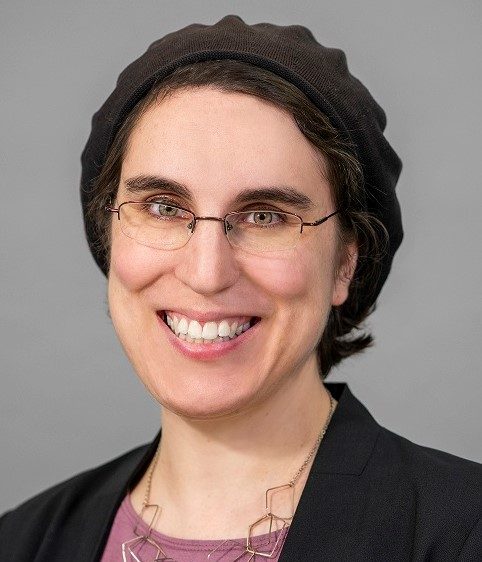Jack Flamholz Memorial Yom Iyyun

Miriam Gedwiser
Miriam Gedwiser is the Rosh Kollel of the Drisha Summer Kollel and teaches Talmud and Tanakh at the Ramaz Upper School. She has a B.A. in the History, Philosophy, and Social Studies of Science and Medicine from the University of Chicago and a J.D. from N.Y.U. School of Law. Miriam studied at Midreshet Lindenbaum and in the Drisha Scholar’s circle. She previously practiced commercial litigation at a large law firm and clerked for the Hon. Debra Freeman, U.S.M.J., in Manhattan. Miriam serves as a guest lecturer at synagogues and programs around the Northeast, and has written on topics of Jewish and Torah interest for The Lehrhaus, The Forward, the Center for Modern Torah Leadership blog, and Project 929. Miriam lives Teaneck, New Jersey with her family.
Dr. Aaron Koller
Aaron Koller is associate professor of Near Eastern and Jewish Studies at Yeshiva University, where he is chair of the Robert M. Beren Department of Jewish Studies, and also Core Faculty and Coordinator of Adult Educational Programming at Drisha. His most recent book was Esther in Ancient Jewish Thought (Cambridge University Press, 2014), and his next book, Unbinding Isaac, on the ‘aḳedah in religious philosophy, is forthcoming, but he usually works on Semitic languages and linguistics. Aaron has served as a visiting professor at the Hebrew University in Jerusalem, and held research fellowships at the Albright Institute for Archaeological Research and the Hartman Institute. He lives in Queens with his wife, Shira Hecht-Koller, and their children.
Shira Hecht-Koller
Shira Hecht-Koller is the Director of the Dr. Beth Samuels Summer High School Program at Drisha and Director of Education for 929 English. She teaches Talmud and Jewish identity to a wide variety of audiences, and writes and speaks on topics of education, creative living and family life. She was a Fellow at the Paideia Institute of Jewish Studies in Stockholm, where she continues to serve as a consultant. She holds a certificate in Experiential Jewish Education from M²: The Institute for Experiential Jewish Education, where she is adjunct faculty. She is a graduate of the Beruria Scholars program at Midreshet Lindenbaum and holds a JD from Cardozo School of Law. Prior to embarking on a career in Jewish Education, she was an associate in the Intellectual Property department at Debevoise & Plimpton, LLP. She is an avid tennis fan, amateur photographer and loves to hike and explore the world with her partner Aaron and children Dalya, Shachar, Amitai and Aiden.
Click here to access podcasts recorded by Shira Hecht-Koller.
Sarah Zager
Sarah Zager received her PhD from Yale University in 2022, where her research focused on the influence of Judaism and Christianity on moral philosophy. Originally from Albuquerque, New Mexico, Sarah earned an MA in Religion from the University of Chicago Divinity School and a BA from Williams College. She was awarded the Leo Baeck Fellowship for the study of German Jewry, and was a David Hartman Center Fellow at the Shalom Hartman Institute of North America. She has also learned at Yeshivat Hadar. She has written for The Lehrhaus, JewSchool, The Journal of Jewish Ethics, and Nashim.
Raphael Magarik
Raphael Magarik is a shoel u’meishiv and teaches aggadah at Mechon Hadar and is a graduate student in English literature and Jewish Studies at the University to California, Berkeley. He has studied at Yeshivat Maale GIlboa, Drisha, and Yeshivat Hadar, as well as at Berkeley, Yale (where he received his BA), and Hebrew University. He teaches for Kevah and is a co-founder of Minyan Dafna, a traditional egalitarian minyan in Berkeley.
Click here to access podcasts recorded by Raphael Magarik.
Rabbi Dr. Jeffrey Rubenstein
Rabbi Jeffrey L. Rubenstein, Ph.D., Skirball Professor of Jewish Thought & Literature at New York University, and author of a number of books and articles.
Book Publications
-
Johns Hopkins University Press, 2010

-
Johns Hopkins University Press, 2003

-
Paulist Press, 2002

-
Johns Hopkins University Press, 1999

-
Scholars Press, 1995

-
Jewish Publication Society and University of Nebraska Press, 2018

EDITED BOOKS
-
Oxford University Press, 2013

-
Nominalism and Realism in Halakha Revisited, special volume of Diné Yisrael 302015
-
SBL Press, 2018

ARTICLES
“Astrology and the Head of the Academy.” Shoshanat Ya’aqov (Ya’aqov Elman Festschrift). Ed. Shai Secunda and Steven Fine (BRLJ 35; Leiden: Brill, 2012), 303-21.
“The Bavli’s Ethic of Shame.” Conservative Judaism 53:3 (2001), 27-39.
“Bavli Gittin 55B-56B: An Aggadic Narrative in Its Halakhik Context.” Hebrew Studies 38 (1997), 21-45.
“Can a Goses Suvive for More Than Three Days? The History and Definition of the Goses,” Jewish Ethics 2 (2016), 1-37.
“Context and Genre: Elements of a Literary Approach to the Rabbinic Narrative.” How Should Rabbinic Literature be Read in the Modern World. Ed. Matthew Krauss. (Piscataway, NJ: Gorgias Press, 2006), 137-166.
“Coping with the Virtues of the Land of Israel: An Analysis of Bavli Ketubot 110b-112a” [התמודדות עם מעלות ארץ ישראל: ניתוח סוגיית בבלי, כתובות קי ע”א-קיב ע”ב]. In Israel-Diapora Relations in the Second Temple and Talmudic Periods. Ed. I. Gafni (Jerusalem: Shazar Institute, 2004), 159-88 (Hebrew).
“Criteria of Stammaitic Intervention in Aggada.” In Creation and Composition: The Contribution of the Bavli Redactors (Stammaim) to the Aggada. Ed. Jeffrey L. Rubenstein. (Tuebingen: Mohr-Siebeck, 2005), 417-440.
“Cultic Themes in Sukkot Piyyutim.” Proceedings of the American Academy of Jewish Religion 49 (1993), 185-209.
“Dialectics and the Aggada of the Bavli” [הדיאלקטיקה כנושא מרכזי באגדה הבבלית]. Dinei Yisrael 24 (2007), 215-233.
“Elisha ben Abuya: Torah and the Sinful Sage.” Journal of Jewish Thought and Philosophy 7 (1998), 141-222.
“An Eschatological Drama: Bavli Avoda Zarah 2a-3b.” Association for Jewish Studies Review 21:1 (1996), 1-37.
“Ethics and the Liturgy of Conservative Judaism.” Judaism 40 (Winter, 1991), 95-114.
“The Explanation of Tannaitic Sources by Abstract Principles.” In Neti’ot Ledavid: Jubilee Volume for David Weiss Halivni. [פירושי מקורות תנאייים על ידי עקרונות כלליים ומופשטים]. Eds. Y. Elman, E. Halivni and Z. Steinfeld. (Jerusalem: Orhot Press, 2004), 275-304 (Hebrew).
“From Mythic Motifs to Sustained Myth: The Revision of Rabbinic Traditions in Medieval Midrashim.” Harvard Theological Review 89:2 (1996), 131-160.
“Hero, Saint, and Sage: The Life of R. Eleazar b. R. Shimon in Pesiqta deRav Kahana 11.” The Faces of Torah: Studies in the Texts and Contexts of Ancient Judaism in Honor of Steven Fraade. Ed. Michal Bar-Asher Siegal, Tzvi Novick and Christine Hayes (Vanderhoeck and Ruprecht, 2017).
“Introduction.” In Creation and Composition: The Contribution of the Bavli Redactors (Stammaim) to the Aggada. Ed. Jeffrey L. Rubenstein. (Tuebingen: Mohr-Siebeck, 2005), 1-21.
“Introduction.” In The Formation of the Babylonian Talmud, by David Weiss Halivni. Translated, Introduced and Annotated by Jeffrey L. Rubenstein (New York: Oxford University Press, 2013), xvii-xxxv.
“King Herod in Ardashir’s Court: The Rabbinic Story of Herod (Bava Batra 3b-4a) in light of Persian Sources.” AJSR 38:2 (2014), 231-56.
“The Laws of Heaven in Sefer Hasidim.” Freedom and Responsibility: Exploring the Dilemmas of Jewish Continuity. Ed. M. Edelman and R. Geffen (Gratz College Festschrift) (New York: Ktav, 1998), 69-89.
“Martyrdom in the Persian Martyr Acts and in the Babylonian Talmud.” The Aggadah of the Bavli and its Cultural World. Ed. Jeffrey L. Rubenstein and Geoffrey Herman (Brown Judaica Series; Providence, RI: SBL Press, 2018)
“Mythic Time and The Festival Cycle.” Journal of Jewish Thought and Philosophy 6 (1997), 157-183.
“Nominalism and Realism Again,” Nominalism and Realism in Halakha Revisited, special volume of Diné Yisrael 30 (2015), 79-120.
“Nominalism and Realism in Qumranic and Rabbinic Law: A Reassessment.” Dead Sea Discoveries 6 (1999), 157-183.
“On Some Abstract Concepts in Rabbinic Literature.” Jewish Studies Quarterly 4 (1997), 33-73.
“On the Culture of the Bavli.” In Of Scribes and Sages: Early Jewish Interpretation and Transmission of Scripture, vol. 2.. Ed. Craig E. Evans. (London: T & T Clark, 2004, 115-122.)
“The Plot Against Rabban Shimon b. Gamaliel (bHorayot 13b-14a): A Literary Analysis.” Proceedings of the Twelfth World Congress of Jewish Studies-1998 (2001): 429-444
“Purim, Liminality, and Communitas.” Association for Jewish Studies Review 17 (1992), 247-277.
“A Rabbinic Translation of Relics.” Crossing Boundaries in Ancient Judaism and Early Christianity: Ambiguities, Complexities, and Half-Forgotten Adversaries: Essays in Honor of Alan F. Segal. Ed. Kimberly Stratton and Andrea Lieber (Leiden: Brill, 2016), 314-334.
“The Rise of the Babylonian Talmudic Academy: A Reexamination of the Talmudic Evidence.” Jewish Studies, an Internet Journal (http://www.biu.ac.il/JS/JSIJ/jsij1.html; 2002)
“The Role of Disgust in Rabbinic Ethics,” in Michael L. Satlow, ed., Strength to Strength: Essays in Honor of Shaye J.D. Cohen (Providence, Rhode Island: Brown Judaic Studies, 2018), 421-436
“The Sadducees and the Water Libation.” Jewish Quarterly Review 84:4 (1994), 413-440.
“The Shaming of Abdan.” Torah le-Shamma: Shamma Friedman Jubilee Volume. Edited M. Benovitz et al. (Jerusalem: Leshon Limudim, 2008), xx-xlvii.
“Siddur Sim Shalom and Developing Conservative Theology.” Conservative Judaism 49 (Fall, 1988), 21-38
“Social and Institutional Settings of Rabbinic Literature.” The Cambridge Companion to Rabbinic Literature. Eds. Charlotte Fonrobert and Martin Jaffee. (Cambridge: Cambridge University Press, 2007), 58-74.
“Some Structural Patterns of Yerushalmi Sugyot.” In The Talmud Yerushalmi in Graeco-Roman Culture III. Ed. Peter Schaefer (Tubingen: Mohr-Siebeck, 2003), 303-314
“The Story of the Oven of Akhnai: Literary Analysis” [סיפור תנור של עכנאי: ניתוח ספרותי]. In Higayon L’Yona: New Aspects in the Study of Midrash, Aggadah and Piyyut. in Honor of Yonah Fraenkel. Ed. J. Levinson. (Magnes Press, Hebrew University, 2006), 457-478 (Hebrew).
“The Sukka as Temporary or Permanent Dwelling: A Study in the Development of Talmudic Thought.” Hebrew Union College Annual 64 (1993), 137-166.
“Sukkot, Eschatology and Zechariah 14.” Revue Biblique 103-2 (1996), 161-195.
“The Sukkot Wine Libation.” In Ki Baruch hu, Ancient Near Eastern, Biblical and Judaic Studies in Honor of Baruch A. Levine. Eds. R. Chazan, W.W. Hallo, and L. H. Schiffman (Winona Lake, IN: Eisenbrauns, 1998).
“The Symbolism of the Sukkah.” Judaism 43 (Fall, 1994), 371-387.
“The Symbolism of the Sukka (Part 2).” Judaism 45 (1996), 387-398.
“Syriac Christian Sources and the Babylonian Talmud.” Aaron Michael Butts and Simcha Gross (eds.), Jews and Syriac Christians: Intersections across the First Millennium (Texts and Studies in Ancient Judaism; Tübingen: Mohr Siebeck, forthcoming).
“Talmudic Astrology: Bavli Šabbat 156a-b.” Hebrew Union College Annual 78 (2007)
“Talmudic Stories and Their Rewards.” Why Study Talmud in the Twenty-First Century? Ed. Paul Socken (Lanham, MD: Rowman & Littlefield, 2009), 177-94
“The Talmud Expression “Rabbi X, following his reasoning said” [ר’ פלוני לטעמיה דאמר]. Sidra 10 (1995), 111-130 (Hebrew).
“The Thematization of Dialectics in Bavli Aggada.” Journal of Jewish Studies 53:2 (2003), 71-84.
Rivka Schwartz
Dr. Rivka Press Schwartz has spent more than fifteen years in the field of Jewish secondary education. She currently serves as the Associate Principal, General Studies at SAR High School, and has served as Director of General Studies at the Frisch School. Dr. Schwartz earned her BA in Physics and History of Science at Case Western Reserve University. She earned her MA and PhD from Princeton University, writing her dissertation about the cultural history of the Manhattan Project. In addition to teaching high school, she has served as an adjunct professor of history at Yeshiva and Stern Colleges. She lectures widely both on the history of science and on Jewish topics, frequently addressing issues of contemporary importance in the American Jewish community.
Bernard Steinberg
Dr. Bernard Steinberg, Director Emeritus of Harvard Hillel, also served as President of the Harvard Chaplains, and lecturer at the Kennedy School of Government. He has conducted workshops on moral leadership for The Center for Curatorial Leadership in New York, a year-long fellowship for distinguished museum curators from the US and around the world, and teaches at the Center for Jewish Studies at the Graduate Theological Union in Berkeley, California. Steinberg was a founding Fellow of the Shalom Hartman Institute and among the founders of the Pardes Institute of Jewish Studies. He taught Jewish thought at the Hebrew University and served on the faculty of The Wexner Heritage Foundation, a national fellowship program for Jewish leaders. He has a PhD in Jewish Philosophy from the Hebrew University in Jerusalem, an MA in modern Jewish thought from Brandeis University, and a BA in literature from Wesleyan University. Dr. Steinberg is a recipient of the Benjamin J. Shevach Award for Distinguished Leadership in Jewish Education conferred by the Boston Hebrew College and the Covenant Award for Excellence in Jewish Education.
Jack Flamholz was a born and bred Brooklyn boy, an avid learner, and a true Renaissance Man. He had a strong interest in Jewish American history which inspired Drisha and the Luchfeld- Flamholz family to organize a Yom Iyun in his memory.
Session 1: “Dirshu Et Shalom HaIr Asher Hegleti Etchem Shama: On American Jews and American Citizenship” – Dr. Rifka Schwartz
Session 2: “Jewish and American Ethos During Tumultuous Times: Complementary and Conflicting Visions of Human Dignity and Worth” – Dr. Bernard Steinberg
Session 3: “The Rule of Law: Promises and Pitfalls?” – Miriam Gedwiser
Session 4: “Separation of Shul and State: Torah Study as an Alternative to Theocracy” – Rabbi Dr. Jeffrey Rubenstein
Session 5: “Hebrew And Jewish Identity in America” – Dr. Aaron Koller
Session 6: “Humans and Animals in Tanach” – Dr. Yoni Pomeranz
Session 7: “Esther, Ruth, and the Insider/Outsider Jew” – Shira Hecht-Koller
Session 8: “Jewish Philosophical Perceptions of Gentiles in (Early) Modern Europe” – Dr. Shira Billet
Session 9: “Mushrooms and Lullabies: The Public/Private Divide in Rabbinic Sources” – Sara Zager
Session 10: ““You didn’t build that”: A Morally Mature Theology of Thanksgiving” – Raphael Magarik
– These sessions are not in any specific order –
Click here to read “On Citizens and Soda Cans,” a piece written by Rivka Schwartz for The Jewish Week.





